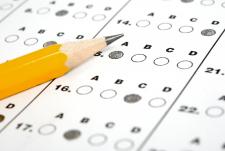Juniors: When to begin testing?
Posted on Wed, 11/28/2012 - 16:22
Most students will want to take either the SAT or ACT once by the end of junior year -- usually taking either test for the first time in the winter or spring. (The SAT is first offered in January; the ACT in February.) This timing allows you to capitalize on having just completed Algebra II, as well as further coursework in English. No timetable suits all students, but all students should begin thinking of creating a testing plan, taking into account planning for the SAT or ACT, Subject Tests, and AP exams (if enrolled).
For more information on testing, including how colleges view standardized testing, how to create a testing plan, and more, see Chapter 7, "Testing," in College Admission: From Application to Acceptance, Step by Step. And find more free test prep resources here on our website.










